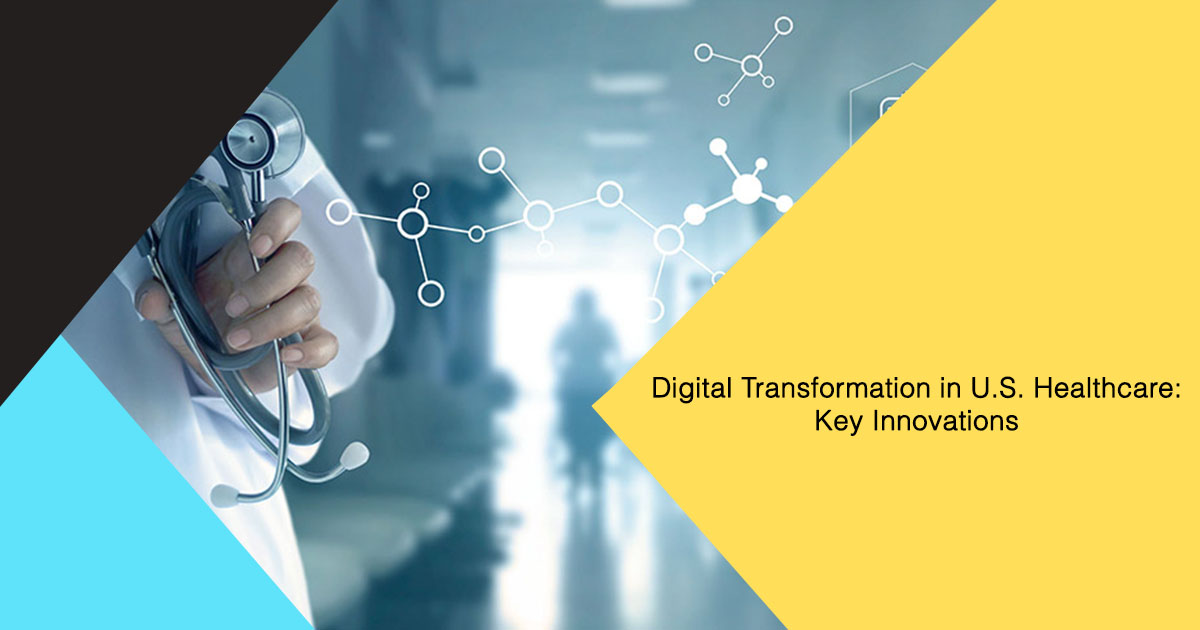Digital Transformation in U.S. Healthcare: Key Innovations

Digital transformation in U.S. healthcare is reshaping the industry by leveraging technology to improve care delivery, patient outcomes, and operational efficiency. Here are some key innovations driving this transformation:
1. Telemedicine and Remote Care
- Virtual Consultations: Telehealth platforms enable patients to connect with healthcare providers remotely, expanding access to care, especially in rural or underserved areas.
- Remote Patient Monitoring (RPM): Devices like wearables and smart health monitors track vital signs, glucose levels, and more, enabling real-time interventions.
2. AI and Machine Learning
- Diagnostics: AI-powered tools assist in diagnosing conditions like cancer, heart disease, and rare disorders with high accuracy.
- Predictive Analytics: Machine learning algorithms analyze patient data to predict outcomes, reducing readmissions and optimizing treatments.
- Administrative Automation: AI streamlines tasks such as scheduling, billing, and documentation, reducing administrative burdens.
3. Interoperability and Data Sharing
- Electronic Health Records (EHRs): Interoperable systems allow seamless sharing of patient data across healthcare providers, ensuring continuity of care.
- Health Information Exchanges (HIEs): Facilitate secure data sharing among institutions and stakeholders, improving coordinated care.
4. Precision Medicine
- Genomics: Advances in genetic testing enable personalized treatment plans tailored to individual patient profiles.
- Targeted Therapies: Innovations focus on treatments designed for specific patient subgroups based on genetic and molecular data.
5. Blockchain in Healthcare
- Data Security: Blockchain ensures secure, tamper-proof health records.
- Supply Chain Management: Enhances transparency in pharmaceutical supply chains, reducing fraud and ensuring authenticity.
6. Digital Therapeutics
- Apps and Platforms: FDA-approved digital tools deliver therapeutic interventions for managing chronic conditions like diabetes and mental health issues.
- Behavioral Interventions: Programs targeting lifestyle changes, such as smoking cessation or stress management.
7. Augmented Reality (AR) and Virtual Reality (VR)
- Medical Training: VR simulations offer immersive learning experiences for medical students and surgeons.
- Patient Care: AR/VR tools are used in pain management, rehabilitation, and mental health therapies.
8. 5G Connectivity
- Enhanced Telehealth: Ultra-fast networks support real-time video consultations and data-intensive applications like remote surgeries.
- IoT Integration: Facilitates the connectivity of smart devices and sensors for comprehensive patient monitoring.
9. Health Equity through Technology
- Access to Information: Mobile health (mHealth) apps and multilingual platforms address disparities in healthcare literacy.
- Community-Based Solutions: Innovations like mobile clinics and community health platforms improve accessibility in underserved regions.
10. Sustainability and Green Initiatives
- Energy-Efficient Data Centers: Cloud computing reduces the environmental impact of healthcare IT infrastructure.
- Paperless Systems: Digital transformation minimizes waste by replacing paper-based processes.
Challenges and Considerations
Despite these advancements, challenges such as data privacy, regulatory compliance, workforce training, and cost remain. Addressing these issues is critical for maximizing the benefits of digital transformation in healthcare.
Would you like more details on any specific innovation?










